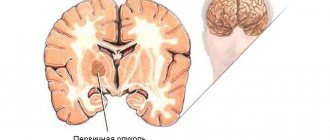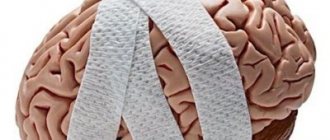Absent-mindedness is a malfunction of the nervous system. Distracted attention in adult men and women can be considered normal if it occurs occasionally. For example, at the end of a busy day at work, many people become inattentive. Chronic fatigue, lack of sleep or heavy physical activity, and somatic deterioration of well-being during a cold give a similar result.
But what to do if absent-mindedness and forgetfulness follow a person everywhere? If, due to your inattention, relationships with loved ones deteriorate, problems arise at work or in school. There is only one answer - to look for the reasons for absent-mindedness, inattention, and forgetfulness. Let's take a closer look at why absentminded attention occurs in adult women and men and how to treat it. But first, let’s define what absent-mindedness is in psychology.
What is absent-mindedness
Distraction of attention is the inability to concentrate on one thing (object, phenomenon, matter) for a long time. Simply put, these are problems with voluntary attention.
Voluntary attention is a type of attention in which a person needs to make volitional efforts to focus on something. There is also involuntary and post-voluntary attention. In the first case, we are talking about weak-willed attraction of attention: a door slammed, a dog barked, a siren screeched, etc. In the second case, we are talking about concentrating attention through volitional efforts, but to a lesser extent than with voluntary attention.
Distraction of attention is not an independent disease. As a rule, it occurs with psychopathy, asthenia, atherosclerosis, hypertension, chronic cerebrovascular insufficiency, diabetes mellitus, and hypothyroidism. In healthy people - against the background of fatigue.
In children, absent-mindedness is often combined with ADHD - attention deficit hyperactivity disorder.
Etiology
The cause of impaired concentration and forgetfulness in children and adults can be either a specific disease or characteristics of a person’s psychotype.
As for pathological processes that can act as etiological factors, these include:
- oncological processes in the brain;
- impaired blood supply to the brain, oxygen starvation;
- vascular dementia and Alzheimer's disease (senile dementia);
- vegetative-vascular dystonia;
- severe headaches (most often migraines);
- arterial hypertension, high blood pressure;
- lack of essential vitamins and minerals in the body;
- autoimmune and systemic diseases that affect the brain and nervous system;
- anemia;
- chronic insomnia.
In addition to diseases, forgetfulness and absent-mindedness can also be caused by psychological disorders, namely:
- epilepsy;
- schizophrenia and schizoaffective disorder;
- clinical depression;
- severe nervous shock, stress.
Also, increased absent-mindedness can be caused by severe fatigue, lack of sleep, and frequent nervous strain.
Causes of absent-mindedness
Types of absent-minded attention
Psychologists distinguish three types of absent-minded attention:
- Functional. Absent-mindedness, inattention and forgetfulness are caused by monotonous, monotonous work. In everyday life, people call this “blurred eyes.” In addition, functional absent-mindedness occurs due to somatic health problems, against the background of insomnia or restless sleep, lack of sleep, and also due to headaches. Remember your condition after a sleepless night or during a cold. I'm sure your attention span leaves much to be desired. Like all people in a similar condition.
- Poetic. This is absent-mindedness due to daydreaming. It is always difficult for creative people to concentrate on one thing for a long time, especially monotonous ones. However, once they enter a state of flow, they can create for hours and even days. But we are talking specifically about creativity, about what interests them.
- Minimal. This is inattention due to excessive immersion in one’s own thoughts and personal experiences. For example, have you ever read a few paragraphs or a whole page of a book, and then caught yourself thinking that you didn’t understand anything because you were thinking about something else? Or has it ever happened that while communicating with someone you said: “Sorry, I overheard you and got lost in thought”? These are all examples of minimal distraction.
Separately, it is worth noting that absent-minded attention can be normal and pathological. The first includes forgetfulness due to fatigue. The second is inattention and forgetfulness, which have medical grounds. We'll talk more about the causes of concentration problems below.
Diagnostics
To find out how to deal with absent-mindedness in your case, you need to visit an endocrinologist for a detailed medical history and obtain prescriptions for laboratory diagnostics. Research at the stage of visiting an endocrinologist includes tests, ultrasound diagnostics, and identification of predisposition to hereditary diseases. If a patient has chronic illnesses, he regularly faces stress, sleeps poorly, and absent-mindedness is not surprising. Sometimes additional studies may be required: ECG, encephalogram, etc.
Manifestations of absent-minded attention syndrome
We have already examined the general specifics of the manifestations of absent-minded attention syndrome. However, in practice there are different manifestations:
- insufficient concentration – problems with remembering what you see or hear;
- rigidity – inhibition of attention, problems with switching attention from one object (phenomenon) to another;
- unstable attention - involuntary and very rapid jumping from one subject to another, forgetfulness.
The first type often occurs against the background of fatigue, anxiety or lack of sleep. The second is for hypomania and epilepsy. The third is for ADHD.
Interesting! Scientists distinguish a special type of memory. People of science tend to forget everything that does not relate to their professional activities. The same effect is noticeable in some other professions.
Classification
The following types of absent-mindedness are distinguished:
- imaginary absent-mindedness - in this case, a violation of the psychological plan is implied, we are not talking about the development of a pathological process. With apparent absent-mindedness, a person concentrates attention on certain events, causing everything else to fade into the background;
- genuine absent-mindedness - in most cases, the cause of genuine absent-mindedness is the development of a certain pathological process or a severe psychoneurological disorder.
Imaginary absent-mindedness does not require specific treatment, and its signs are only symptomatic. However, if the symptom appears frequently and for quite a long time, you should consult a doctor. Especially when it comes to a child.
Causes
Causes of absent-minded attention in adults:
- Exhaustion and overwork. Hard work without rest, weekends and holidays can lead to this. Particularly vulnerable are people whose profession involves intellectual work, for example, teachers, writers.
- Reluctance to do something. In some cases, forgetfulness is an attempt by the brain to protect us from unpleasant information or an unpleasant task.
- Working in a multitasking environment. If a person is literally torn between several jobs, tasks or completely different areas of life, then very soon his memory and attention begin to fail.
- Other attention disorders, such as ADHD.
- Other diseases, for example, alcoholism, drug addiction. This also includes working in hazardous industries and other intoxications of the body.
- Hormonal changes. We are talking about pathologies of the thyroid gland or other problems with the production of hormones, as well as about natural hormonal changes, for example, during pregnancy in women and during adolescence in children.
- Age-related changes. Many adult women and men over the age of 30 experience absent-mindedness, forgetfulness and poor memory. This may be due to a lack of intellectual activity or, conversely, to mental overload. It is also associated with bad habits and stress. As a treatment, it is recommended to reconsider your lifestyle.
Note! Distracted attention can be a consequence of intellectual, physical or psychological exhaustion.
Why memory deteriorates and attentiveness decreases
Before we talk about treating forgetfulness, we need to understand why it appeared. The following are the main causes of poor memory and absent-mindedness.
- Age. According to epidemiological studies, about 50% of people over 60 years of age complain of decreased cognitive function[1]. The first cause of absent-mindedness and inattention is physiological changes in brain tissue. Already in the fourth decade of a person’s life, the mass of his brain gradually begins to decrease[2], and from the age of 50, the number of neurons steadily decreases annually[3]. By the age of 70–80, the degree of loss of these cells in some parts of the brain - the frontal lobe, the superior temporal gyrus - can reach 48%[4]. Changes concern not only the number of nerve cells, but also the functional properties of neurons, connections between them: the number of dendrites, synapses, receptors and glial elements decreases. The production of the main neurotransmitters - dopamine, norepinephrine, acetylcholine - is reduced. All this inevitably affects the decline of cognitive functions, primarily memory and attention.
- Diseases. According to some studies, diabetes mellitus, hypertension, hypercholesterolemia and smoking increase the risk of developing cognitive impairment and dementia[5]. The fact is that as a result of such diseases and bad habits, insufficient blood supply to the brain and its hypoxia occur. With poor memory and absent-mindedness, the causes can also be degenerative processes in the brain (in particular, Alzheimer's disease), traumatic brain injuries and concussions, cardiovascular failure, stroke, endocrine disorders, some viral diseases, and alcohol abuse.
- Stress and hard work. Excessive or chronic stress leads to decreased cognitive abilities. A study conducted on people 40 years of age and older found that high levels of cortisol (a hormone involved in stress responses) in subjects were associated with poorer memory and visual perception, as well as comparatively lower overall gray matter volume in the brain[6]. . A high level of stress at work, a feeling that it is becoming increasingly difficult to keep up with the times, sometimes lead to depression and even depression. In this regard, it is necessary to pay due attention to your lifestyle and emotional problems so that they do not become an additional cause of memory deterioration and a decrease in energy resources.
When cognitive impairment occurs, people do nothing for a long time to solve this problem. Often, the first attempts to improve the situation are made only after relatives and colleagues point out changes. But it is better not to wait for this moment and, as soon as the first difficulties in performing everyday tasks are noticed, begin to help the body. This especially applies to people over 50 years of age. The causes of absent-mindedness in adults and older people, as described above, have a physiological basis and, unfortunately, are inevitable. However, it is possible to prevent the progression of symptoms.
How to overcome absent-mindedness: treatment for cognitive decline
Timely adoption of treatment and preventive measures can stop the development of cognitive impairment. For absent-mindedness and poor memory, treatment is carried out in two main ways: pharmacological and non-medicinal. Let's look at each of them in more detail.
A pharmacological method of improving memory and concentration is taking pharmaceuticals, which can be divided into three branches:
- Dietary supplements and vitamin-mineral complexes. Before you start taking vitamins and mineral supplements, you should get tested to find out if you really need them and which nutrients you need.
Otherwise, you can’t count on improvements in the functional activity of the brain[7]. In this case, an excess of active substances can lead to dangerous complications. Experts warn that uncontrolled use of dietary supplements is dangerous. This is due to the following features of dietary supplements: insufficient knowledge of many of them, lack of reliable information about the compatibility of the components of the composition and interaction with drugs, the content of potent and foreign components in supplements, the risk of overdose [8]. - Herbal medicines. When attention is absent in adults, treatment with herbal remedies is especially popular, since there is an opinion that natural remedies are safe and effective. However, herbal products have many restrictions on their use. For example, due to the risk of internal bleeding, preparations based on ginkgo biloba leaf extract cannot be combined with medications to prevent blood clots and thin the blood, especially acetylsalicylic acid. But it is contained in many medications and is prescribed to many older people for preventive purposes.
- Medicines to improve brain function . When concentration decreases and absent-mindedness appears, treatment with this group of drugs brings the most predictable and noticeable effect. Synthetic drugs are developed to specifically combat the problem and act simultaneously in several directions: they restore the functioning of neurons, improve the supply of oxygen and nutrients to the brain, and have a neuroprotective effect without additional stress on other organs. All medicines must undergo official testing for effectiveness and safety before they are entered into the State Register.
Please note Even among the products sold in pharmacies, you can run into ineffective ones. For example, aminoacetic acid, which is the main active ingredient of some well-known nootropics, does not pass through the blood-brain barrier (does not penetrate the brain), and the severity of its clinical effect, according to research, is minimal[9].
A non-drug method for improving cognitive function is to normalize your lifestyle. It is recommended to sleep about eight hours a day - you should fall asleep before midnight, eat a balanced diet (in old age, it is recommended to reduce protein intake to about 1.2 g per 1 kg of body weight per day [10]), and perform memory and attention exercises ( for example, learn poetry, solve crosswords), pay attention to physical activity. All this has a positive effect on metabolic processes in the body, increases the energy supply of nerve cells, and activates cerebral circulation. Non-medicinal methods require systemic use, and then the result will certainly become noticeable.
Decreased cognitive function is one of the key problems of modern medicine. However, we ourselves must monitor our health, at least pay attention in time to deterioration of memory and concentration. This is the only way to stop the progression of symptoms and prevent the development of serious psychoneurological disorders that arise against this background. The combination of drug treatment and normalization of lifestyle helps to achieve the necessary results. But we must not forget about regular examinations by a specialist.
A drug to improve brain function
Nootropic drugs are developed to have a positive effect on metabolic processes in nerve cells, stimulate blood microcirculation and improve the integrative activity of the brain. One of the modern representatives of this group is Noopept®, a neuropeptide drug with complex action. The active substance in the drug is omberacetam, or N-phenylacetyl-L-prolylglycine ethyl ester.
The action of Noopept® is aimed at:
- stimulation of cerebral circulation;
- improving the rheological properties of blood: reducing its viscosity and the ability to form blood clots in capillaries;
- reduction in the frequency and severity of headaches, dizziness, tachycardia;
- normalization of sleep;
- growth of functional activity of the brain;
- memory restoration at all three stages: memorization, storage and reproduction of information;
- improved concentration, learning ability, and performance.
Noopept® is indicated in cases of cognitive impairment and emotional lability (including in older people) under the following conditions:
- consequences of TBI;
- post-concussion syndrome;
- encephalopathies of any origin;
- asthenic disorders;
- other cases accompanied by a drop in intellectual productivity.
Contraindications for use are minimal: pregnancy and breastfeeding, age under 18 years, individual intolerance to components, severe liver or kidney dysfunction, lactase deficiency, lactose intolerance, glucose-galactose malabsorption.
Noopept® begins to exhibit its anxiolytic and mild stimulating effect approximately on the fifth to seventh day of therapy - in case of organic brain lesions, and on the 14th to 20th day a positive effect on cognitive functions, indicators of attention and memory becomes noticeable.
The drug has a high safety profile: it does not cause addiction, withdrawal symptoms, or drowsiness; its interaction with antihypertensive, hypnotic, psychostimulant drugs and alcohol has not been established.
Noopept® is recommended to be taken twice a day: in the morning and before 18:00, one tablet (10 mg) after meals. It is allowed to increase the daily dose to three tablets (30 mg) after consultation with a doctor. The standard course duration is from one and a half to three months. If necessary, the course can be repeated after a month. A course of treatment requires two packages costing approximately 400 rubles.
* The registration certificate number of the nootropic drug Noopept® (tablets) in the State Register of Medicines is LS-001577 dated July 18, 2011, re-registration date is May 20, 2021. The registration certificate was issued for an indefinite period[11].
** There are contraindications. Specialist consultation is required.
*** The material is not a public offer. Cost information is provided for informational purposes only and is current as of December 2020.
Asthenic disorders are characterized by low performance, fatigue, absent-mindedness, poor sleep and other symptoms.
What to do with asthenia?
Some drugs with nootropic and neuroprotective properties can be purchased without a doctor's prescription. However, before use, you should consult a specialist.
Read more…
You can improve memory and concentration with the help of a set of measures: special exercises, a healthy diet, good rest, as well as taking nootropic drugs that restore the cognitive functions of the brain.
Read more…
Deterioration in memory and concentration may indicate cerebrovascular accident or asthenic disorder.
Nootropic drug...
Elderly people may face problems such as memory impairment, decreased concentration, and sleep disturbances.
How to support the body?
Noopept® is suitable for use in cases of impaired cognitive functions of the brain due to asthenic disorders and deterioration of cerebral circulation.
Find out more...There are contraindications. It is necessary to obtain specialist advice. Sources:
- 1 https://cyberleninka.ru/article/n/kognitivnye-narusheniya-i-ih-lechenie/viewer
- 2.4 https://www.eduherald.ru/ru/article/view?id=14261
- 3 https://medi.ru/info/334/
- 5 https://niikf.tomsk.ru/ftpgetfile.php?id=261
- 6 https://n.neurology.org/content/91/21/e1961
- 7 https://www.aarp.org/content/dam/aarp/health/brain_health/2019/06/gcbh-supplements-report-english.doi.10.26419-2Fpia.00094.001.pdf
- 8 https://cyberleninka.ru/article/n/biologicheski-aktivnye-dobavki-znachenie-i-primenenie/viewer
- 9 https://cyberleninka.ru/article/n/neeffektivnye-lekarstva-vzglyad-klinicheskogo-farmakologa/viewer
- 10 https://rgnkc.ru/images/metod_materials/KR_Pitanie.pdf
- 11 https://grls.rosminzdrav.ru/Grls_View_v2.aspx?routingGuid=548b6f13-3aed-4cd4-a53a-b66c6cd6fba2&t=
Sources used:
- https://simptomer.ru/simptom/rassejannost_
- https://bbf.ru/magazine/26/7273/
- https://aif.ru/boostbook/rassejannost-i-zabyvchivost.html
Symptoms
Signs of absent-mindedness:
- You cannot focus on one thing for a long time. Every now and then you need to drink tea or coffee, smoke, scroll through your social network feed, chat with a friend, etc.
- You constantly forget something: meetings, calls, shopping lists, agreements, some things.
- You often lose things or don't remember where you last put them.
- In written (printed) work, you make so-called “careless” errors. For example, you mix up letters, miss the endings of words, or copy incorrectly from the board or book.
- You forget what happened last week or don't remember entire chunks of your life.
- You immediately forget the names of new acquaintances or information that was told to you.
If all this haunts you every day, in every activity for a long time, then it’s worth thinking about the causes of problems with attention.
Common signs of SAD in children
The syndrome is accompanied by impaired mental activity. The student lacks concentration and cannot do one thing for a long time. Disturbances in social activity begin to appear: he may be withdrawn and thoughtful or, conversely, overly active.
Out of one hundred children, fifteen typically suffer from attention deficit disorder, which manifests itself in a variety of ways. The first signs of deviation can be detected between the ages of four and nine years, but can occur earlier. For example, a one-year-old baby may be overly active, but at the same time his concentration is impaired. At the age of three years, speech problems may appear.
It is worth remembering that manifestations of attention deficit may be different. There are the following types of violation:
- Only lack of attention;
- Impaired attention and impulsivity (mood often changes, can be irritable and aggressive);
- Attention deficit and hyperactivity (restlessness, constantly distracted by something);
- The mixed variety is the most difficult. Behavior is unpredictable, intellectual function is impaired.
How to get rid of absent-mindedness
How to deal with absent-mindedness? Exercise and lifestyle changes will help. At first, in order not to forget anything important, you can use lists, alarm clocks, and visual notes. For example, you can make a to-do list in the evening and hang it above your desk. In principle, many people cannot imagine life without a diary. So this technique is suitable for everyone.
How to become more attentive? Regularly perform several exercises to improve concentration:
- Watch your fingers. Keeping your back straight and your shoulders back, take a comfortable position on a chair or armchair. Raise your right arm to shoulder level and move it to the side. Then turn your head to the right, concentrate your gaze on the fingers of the abducted (right) hand. After a minute, do the same with your left hand and turn your head to the left.
- We follow the arrow. Watch the movement of the second hand for five minutes. Don't look away and don't get lost in your thoughts. Think only about the arrow and its movement. If you get lost, start over.
- We draw a line. Take a pen and paper. Start drawing a straight line, don’t get distracted, think only about this process. If you find yourself distracted, make a small note and continue to draw a straight line. A good result is considered if you can draw a line for 2-3 minutes without being distracted by anything. This exercise helps not only to increase concentration, but also to track the dynamics of training. If the trend is positive, you will see that there are fewer and fewer nicks each time. You can also use this exercise to check your initial level of concentration.
At the same time, do not forget to train your memory:
- We repeat the row. Place several objects in a row in front of you. Look at them for 30-60 seconds. Turn away or close your eyes and recreate the order in which things are located. You can arrange objects not in a row, but, for example, in a square.
- We study the details. Look at an object for a minute. Then close your eyes and try to describe in detail what you saw. Open your eyes and compare. You can complicate the task: remember and describe several objects at once.
- Let's repeat the day. Before going to bed, try to remember the faces and voices of all the people you interacted with. And also remember all the events of the past day.
And, of course, it’s useful to memorize poetry, read, and solve crosswords. All this trains the memory and prevents the brain from relaxing.
If we are talking about functional absent-mindedness, then it is enough to get a good rest. Perhaps you should take a vacation or change jobs.
If absent-mindedness is caused by mental disorders or physical illnesses, then medical treatment is indicated. It is aimed at the root cause, and not at the absent-mindedness itself.
If absent-mindedness, poor memory, weakened concentration and forgetfulness are associated with organic lesions, somatic diseases, hormonal disorders, then medical treatment is indicated. Only a psychologist can identify the exact cause of cognitive problems and select the optimal treatment.
Treatment
Treatment, in this case, implies only an integrated approach, namely:
- neuropsychological correction using tablets;
- classes with a psychologist (for children) or a psychotherapist for adults;
- behavior correction.
Drug treatment involves taking the following pills:
- Glycerol;
- Phenibut;
- Piracetam;
- Biotredin.
In addition, the doctor may prescribe special nutrition and a vitamin-mineral complex in tablet form.
If the cause of such a symptom is a tumor process in the brain, then an operation is performed to excise the tumor with further therapeutic treatment.
Is everything in the article correct from a medical point of view? Answer only if you have proven medical knowledge
Read us on Yandex.Zen
Diseases associated with the “Absent-mindedness” symptom: Alalia
Alalia is a speech function disorder in which the child cannot speak partially (with a poor vocabulary and problems in constructing phrases) or completely. But the disease is characterized by the fact that mental abilities are not impaired, the child understands and hears everything perfectly. The main causes of the disease are considered to be complicated childbirth, diseases or brain injuries received at an early age. The disease can be cured with long-term visits to a speech therapist and by taking medications.
...Alcohol intoxication
Alcohol intoxication is a complex of behavioral disorders, physiological and psychological reactions that usually begin to progress after drinking alcohol in large doses. The main reason is the negative impact of ethanol and its breakdown products on organs and systems, which cannot leave the body for a long time. This pathological condition is manifested by impaired coordination of movements, euphoria, impaired orientation in space, and loss of attentiveness. In severe cases, intoxication can lead to coma.
…Amnesia
Amnesia is the pathological loss of long-term or recent memories. Included in the group of neurological diseases. A violation of this nature can be a consequence of head injuries, as well as certain diseases. Amnesia can also occur against the background of malignant or benign formations.
...Astheno-vegetative syndrome
Astheno-vegetative syndrome is a functional disorder of the autonomic nervous system, which regulates the normal activity of all internal organs and systems of the body. The disease is based on a disturbance in the passage of impulses from nerve endings to tissue cells, or disturbances are observed between neurons of the central nervous system and peripheral systems with the obligatory participation of the autonomic trunk.
...Hepatitis E
Hepatitis E is a rather severe pathology characterized by viral damage to the liver. A distinctive feature from other types of the disease is that it often progresses favorably and ends with recovery. However, at the same time, it poses a danger to pregnant women.
...Hypertrophy of adenoids
Adenoid hypertrophy is a condition in which the nasopharyngeal tonsil becomes large due to hyperplasia of the lymphoid tissue. It should be noted that hypertrophy of the tonsils is combined with hypertrophy of the adenoids; in fact, they are one and the same thing. The main visual symptoms are: open mouth, stuffy nose, nasal voice, frequent viral diseases, regular otitis media. Tonsillitis or other illness may also occur.
...Worms in children
Worms in children are a fairly common occurrence, since they are more exposed to the environment, and helminths enter their bodies with dirty hands, through sand and poorly washed food (vegetables and fruits). Some helminths are transmitted through the blood of the mother to the child in utero, and thus he is already born with parasites living in his intestines or other digestive organs.
...Dementia with Lewy bodies
Dementia with Lewy bodies (syn. diffuse Lewy body disease) is a pathology against which cognitive disorders develop. A feature of this form is the addition of motor disorders. It is noteworthy that the disease almost always occurs in people over 60 years of age.
…Imbecility
Imbecility is a mental retardation of moderate severity, which can be either congenital, for example, Down syndrome, or acquired in the first few years of life. This disorder is characterized by the fact that it does not develop throughout life, but with the right approach to treating and raising such a child, a slight improvement in mental activity can be achieved.
...Manic syndrome
Manic syndrome is a mental disorder of a person’s behavioral state, which is characterized by three types of symptoms: hyperthymia - causes high spirits, tachypsychia - rapid speech with expressive facial expressions, motor disinhibition with hyperactivity.
...Neurosis of the heart
Heart neurosis is a functional disorder of the organ that occurs as a result of various neuropsychic disorders. Often, this disorder develops in people who have a weak nervous system, which is why they have a hard time withstanding various stresses. The disease does not cause anatomical and morphological changes in the organ, and usually has a chronic course. People often talk about this disorder - the heart hurts, and this happens during periods of strong psycho-emotional arousal. Treatment of pathology in most cases is aimed at strengthening the nervous system.
...Osteomyelofibrosis
Osteomyelofibrosis is a disease that is based on damage to the bone marrow. This disease belongs to the group of leukemias. As the disease progresses, the connective tissue in the tubular bones proliferates, and the hematopoietic tissue is replaced by fibrous and bone tissue. Most cases of osteomyelofibrosis affect people between fifty and seventy years of age.
...Hepatic encephalopathy
Hepatic encephalopathy is a disease characterized by a pathological process that occurs in the liver and affects the central nervous system. The result of this disease is neuropsychiatric disorders. This disease is characterized by personality changes, depression and intellectual impairment. You won’t be able to cope with hepatic encephalopathy on your own; you can’t do it without medical intervention.
...Polycystic liver disease
Polycystic liver disease is a hereditary disease characterized by the formation of many cysts in the tissues of the organ (pathological cavity neoplasms, within which exudate is localized). The reasons for the progression of the disease have not yet been thoroughly studied. It is noteworthy that the formation of cavity formations in a child is observed already during its intrauterine development, which gave scientists the opportunity to assume a hereditary factor in its manifestation.
...Rhabdomyolysis
Rhabdomyolysis is a syndrome that develops against the background of damage to skeletal muscles, which is associated with the appearance of a large amount of free myoglobin in the blood. The peculiarity of this disease is that it can develop almost unnoticed by a person.
…Brain cancer
Brain cancer is a disease, as a result of the progression of which a malignant tumor is formed in the brain, growing in its tissue. The pathology is very dangerous and in most clinical situations ends in death. But the patient’s life can be significantly extended if the first signs of the disease are identified in a timely manner and go to a medical facility for comprehensive treatment.
...attention deficit disorder
The occurrence of complications with concentration and concentration, as well as the appearance of a neurobehavioral disorder, indicate the disease “attention deficit disorder” or ADD for short. Children are primarily susceptible to the disease, but the manifestation of the disease in adults cannot be ruled out. Disease problems are characterized by varying degrees of severity, so ADD should not be underestimated. The disease affects the quality of life, its sensitivity, as well as relationships with other people. The disease is quite complex, so patients have problems with learning, performing any work and mastering theoretical material.
...Cerebrasthenic syndrome
Cerebrasthenic syndrome is a neurological pathology. We are talking about a nonspecific symptom complex, which is provoked by the inferiority of the central links of nervous regulation. Literally speaking, this refers to the weakness of the brain as such. The pathology is often called asthenia, asthenic syndrome. The main characteristic of the disease is the failure of adaptation mechanisms. The disease is equally common in both men and women.
...Joseph Addison
With the help of exercise and abstinence, most people can do without medicine.
Prevention
To prevent absent-mindedness and forgetfulness, live by the following rules:
- Adjust your sleep schedule. An adult needs to sleep at least 7 hours, and it is important to go to bed and get up at the same time. You cannot leave the regime even on a day off. Make healthy sleep your habit, watch it.
- Get plenty of rest. Alternate physical and intellectual work, take short breaks during the working day and set aside an hour for lunch. It is recommended to take a 15-minute break every 45 minutes of work.
- Play sports. Regular exercise helps maintain normal hormonal levels, blood circulation and oxygen exchange. In addition, physical activity helps relieve psychological stress and improves mood.
- Take a walk. It is especially useful to walk in the morning and before bed. You can combine sports and walking. For example, you can quickly walk a couple of stops to work. Try to avoid transport and walk as often as possible.
- Develop awareness. This means that you need to live everything according to the “here and now” principle, give up autopilot, live everything at the level of thoughts, feelings and body. Make it a rule to do small workouts: hold a toothbrush or spoon in your left hand rather than your right, pronounce and constantly change your route to work, etc.
- Plan. It's time to turn to schedules, lists and charts. Do not take on several tasks at once, do not accumulate unfinished tasks. Use the Eisenhower Matrix to understand your affairs and tasks.
Interesting! If you suspect that forgetfulness is your defense mechanism, then analyze when it happens. Perhaps it's time for you to give up something, change your priorities and goals in life.
What should parents of an inattentive child do?
Parents play an important role when their child has problems with attentiveness and perseverance. They must fulfill the following requirements:
- be sure to adapt to your child’s routine and constantly comply with it;
- control that the child feels calm during the day, so that he does not become overtired; it is also not advisable for him to spend a long time in front of the TV or computer screen;
- try to interest the child in some sports games, you can sign him up for the pool, and also go with him constantly for walks in the fresh air;
- It is advisable to avoid visiting places with large crowds of people and not to invite a large number of guests.
A child’s attention must be trained from childhood so that in the future he does not develop a state of restlessness, loss and absent-mindedness.
It is advisable to interest him in various educational games. Even in infancy, you need to show different toys and name them so that he can already focus on them. If suddenly you have already noticed signs of attention disorder in your child, then it is necessary at the initial stage to begin to independently develop attentiveness and determination.
Buy educational games, construction sets, mosaics. The child must develop perseverance, and each lesson must be completed to the end, and to facilitate this process, parents must help him with this.










